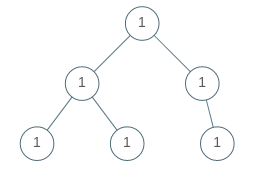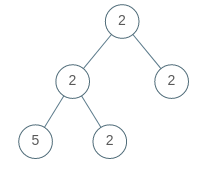Question
A binary tree is uni-valued if every node in the tree has the same value.
Given the root of a binary tree, return true if the given tree is uni-valued, or false otherwise.
Example 1:

Input: root = [1,1,1,1,1,null,1] Output: true
Example 2:

Input: root = [2,2,2,5,2] Output: false
Constraints:
- The number of nodes in the tree is in the range
[1, 100]. 0 <= Node.val < 100
Python Solution
# Definition for a binary tree node.
# class TreeNode:
# def __init__(self, val=0, left=None, right=None):
# self.val = val
# self.left = left
# self.right = right
class Solution:
def isUnivalTree(self, root: TreeNode) -> bool:
stack = [root]
prev = root.val
while len(stack)!=0:
x = stack.pop()
if x==None:
continue
curr = x.val
if prev!=curr:
return False
stack.append(x.left)
stack.append(x.right)
prev = curr
return True
